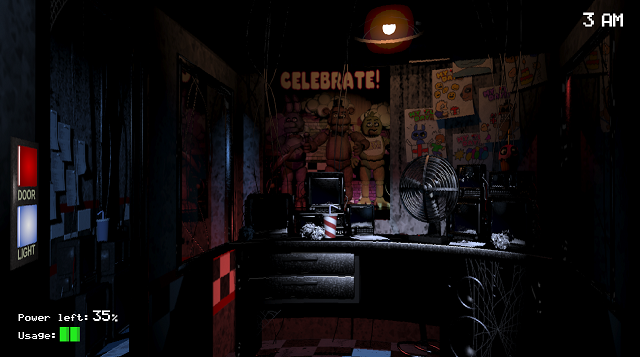After watching a few streamers play through Five Nights at Freddy’s it reminded me that the player’s agency, their ability to control their actions to elicit outcomes, is extremely important to create a consonance (harmony) between the player and the game. And it is when that agency is reduced or limited is when cognitive dissonance sets in. You’re playing a game and you aren’t jiving with it. The actions that you want to do and the reactions that you’re getting on screen aren’t connecting. In psychological terms, you have multiple mental beliefs that are conflicting with one another causing discomfort – cognitive dissonance. The actions that you want to do and the actions that you’re allowed to do are in conflict, causing the anxiety and discomfort. But in a game like Five Nights at Freddy’s (FNAF) or any other suspense game designed to instill paranoia and anxiety, it’s the lack of agency that helps to inspire these emotions.
We can always look back on games the past games like Resident Evil where Jill Valentine moved like a Old 70s Buick, or Panzer Artillery Tank, which actually worked as a benefit to the game. The lack of mobility took away any agility that we could have had and made even the slightest danger – zombie, hound, Lisa Trevor – much more tension-rising than normal because we knew maneuvering pass them was a chore and a half.

Light, or lack of it, is another simple way that games take away our agency. It doesn’t prepare us for the unknown. It takes away our ability to plan when danger is near. We automatically associate the darkness with things that go bump in the night. Darkness leads up to the reveal, because the player not knowing what’s chewing on his crotch (not in the good way) is hardly good game design since they can’t do anything about it. The reveal is also a big go-to just because of the jump scare while giving back some of the player’s agency in the situation. “It’s dark, I’m building up your suspense. Now here’s a SlenderMan in front of you, do something about it.”

It’s the lack of agency that limits the player’s ability to fend for themselves which makes venturing into the unknown all-the-more terrifying. And playing a game like FNAF is taking this lack of agency to the another level because they strip away almost all of your agency. You’re basically stuck in a chair for 10 minutes of real time trying to keep these homicidal animatronic dolls from trying to stuff your face into a metal suit. And it’s the graveyard shift, you have very little light, many dolls to manage with limited power to control the cameras, the doors, pretty much anything that can protect you for that time-frame. It’s not like a jump scare rears its head and you can just run the other way like in Dreadout. It’s not like you can wait out the enemies and just have them pass by you like in Amnesia. Your lack of ability to fend for yourself is paramount to the game’s design and intensify your paranoia and anxiety for those 10 minutes to near heart attack, especially for your first playthrough.

A certain level of agency is important for the player to have for certain games. Suspense and horror are probably one of the few that benefit from a lack of agency when building an ambiance and tension for the player.
Write in the text blob below if you want to discuss more of the matter, or you disagree with me completely. I’m open to the discussion, all the same.


Leave a comment